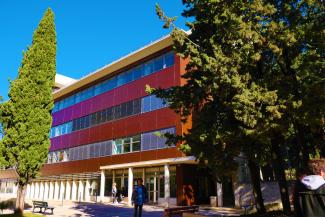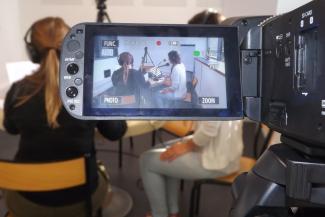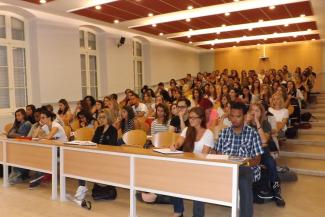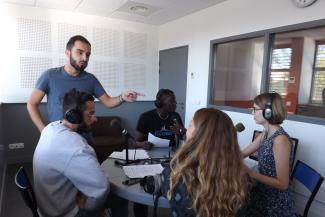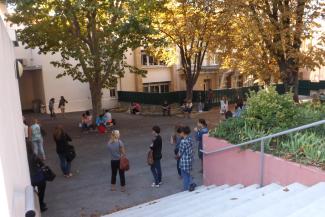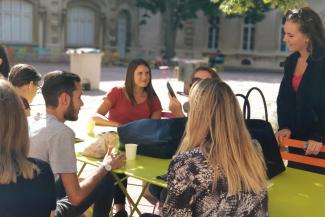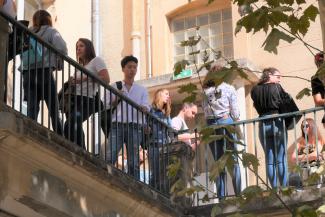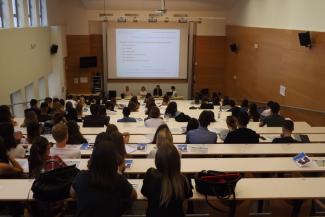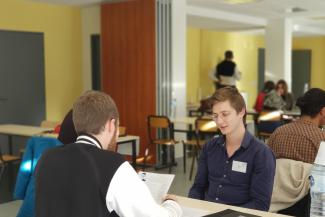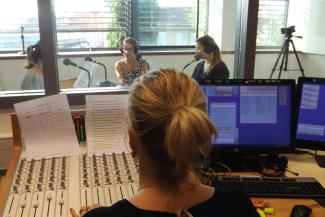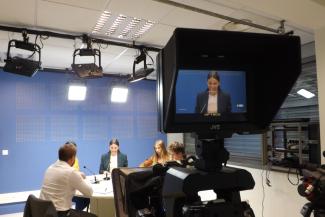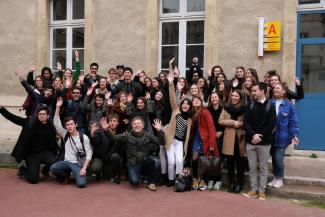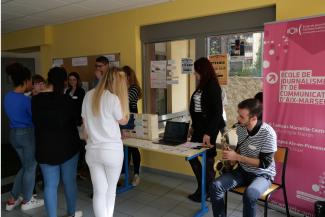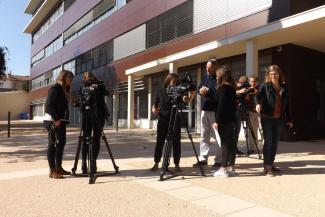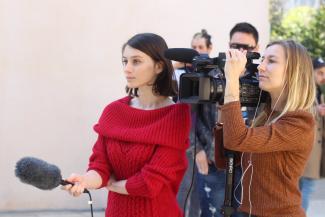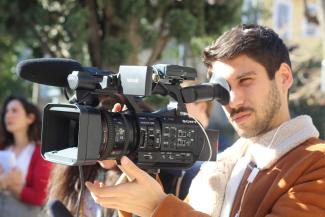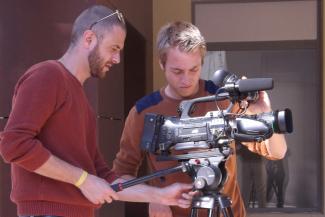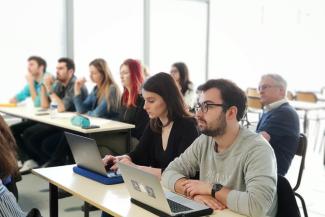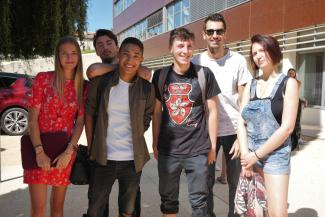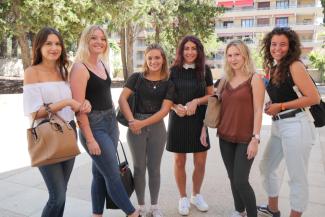Founded in 1982, EJCAM, a faculty of Aix-Marseille University, is a reference in the training of media and communication professionals since forty years.
EJCAM benefits from modern and efficient equipment: professional cameras, sound recording equipment, mobile video equipment, radio studio, TV studio, editing rooms, multimedia rooms and media training studio. A press room on Marseille's site and an information-communication section at the library on the Timone campus complete the access to resources necessary to become familiar with the information, media and communication sectors.
Photographies of EJCAM's students
Recognised by the Commission Paritaire Nationale de l'Emploi des Journalistes (CPNEJ), its Master's degree in Journalism is accessible by competitive examination, like the 13 other training courses approved by the profession. It is open to work-study programs since September 2021. More than thirty professional journalists work alongside the team of researchers to offer training that is as close as possible to the newsrooms and to professional integration. The numerous partnerships, projects, workshops and conferences offered each year also make the program more dynamic.
In order to meet the needs of companies in terms of communication and technological developments, EJCAM offers courses dedicated to the new challenges of digital and communication. After a year of Bachelor's degree in Information and Communication, EJCAM offers a series of innovative courses focused on current communication systems and the future needs of companies. Since the beginning of the 2021 academic year, a first Master's degree in Information and Communication is open to work-study programs, which allows us to diversify our pedagogical approaches, while maintaining our objectives of excellence and professionalization. About a hundred of professionals, specialised in media, communication and digital technology, teach in the various master's programs and in the bachelor's degree program, to complement the theoretical training offered by the professors.
Finally, EJCAM is firmly committed to lifelong learning by welcoming students in the framework of continuing education.
Being a component of a university institution, EJCAM is also committed to promote research in the fields of journalism, communication and the new information professions. In this respect, the courses combine academic requirements with professional imperatives, an asset for students who will have to know how to think, innovate and adapt in order to train or invent a profession which is in a constantly changing world.
1982-2022: 40th anniversary of EJCAM
The courses provided at EJCAM
The EJCAMs' teams
The socio-economic partners of EJCAM
Specialised in journalism (master's degree recognized by the profession), media, digital and communication studies, the Aix-Marseille's School of Journalism and Communication (EJCAM) proposes high quality degree tailored to market needs and the workplace. For each of its master's programs, bridges to the professional world are organized at the local and national levels. It ensures that each of its master’s degree is a gateway into the professional world. The school is proud of its record of work placement: about eighty-five percent of its students are offered employment upon completing their degrees. Seventy-nine percent of those secure long-term employment contracts (CDI). The average waiting period before first work placement is only 4 months..
EJCAM in a few figures: 7 information-communication masters' courses, a master's degree in journalism, a one year graduate degree programme (BA information and communication studies), several partnership courses, more than 500 students, a team of a dozen of teacher-researchers, 14 administrative staffs, a hundred or so of professionals involved in the courses, a site in Aix-en-Provence and a site in Marseille.
Pauline Amiel, Director of EJCAM
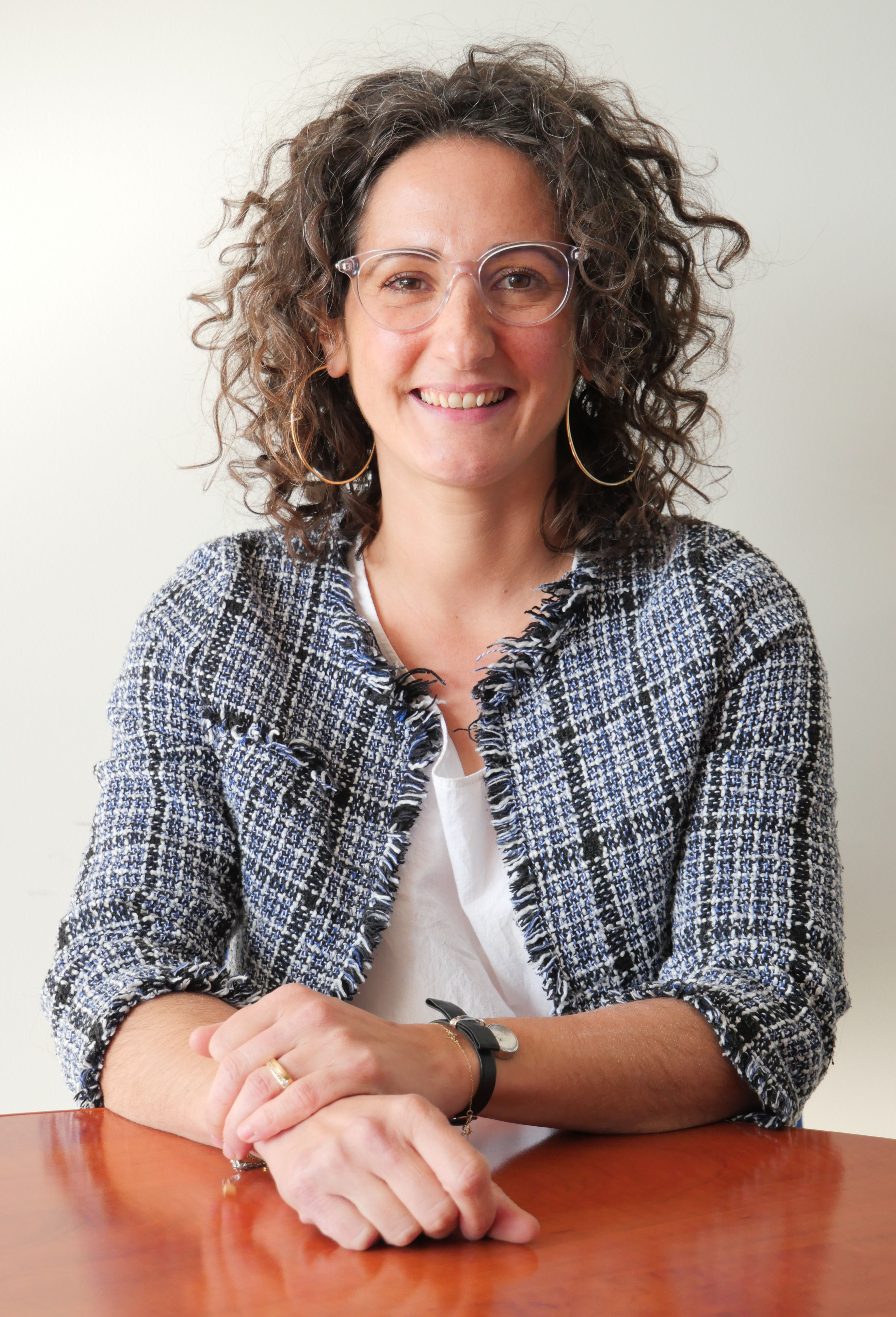
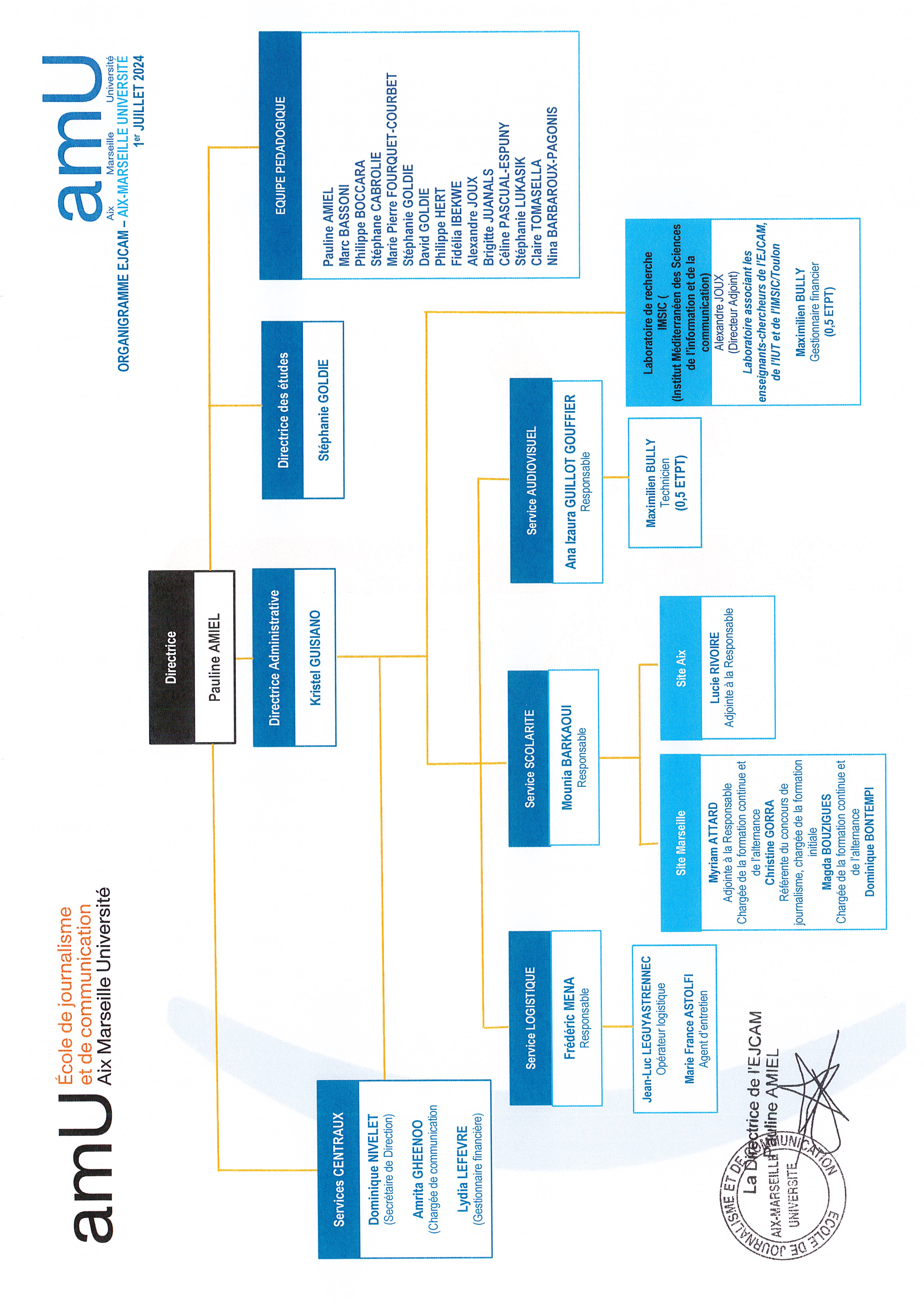
-
A from 2021 up to now
2024 - New training offer
From September 2024, the EJCAM training offer will evolve. The school, with forty-one years of experience, renews its training to better correspond to the needs of the socio-economic worlds of communication, media and digital technology. Academic excellence, professional integration and the well-being of its students continue to guide the work of the EJCAM teams.
2022 - EJCAM celebrated its 40th anniversary
On the occasion of the 40th anniversary of the Aix-Marseille School of Journalism and Communication (EJCAM), the Mediterranean Institute of Information and Communication Sciences (IMSIC) and EJCAM have joined forces to reflect on the evolution of the professions of journalism and communication, at the heart of their respective concerns. Research and pedagogy offered on this occasion a joint, successful and resolutely oriented reflection towards students, alumni, professionals and researchers.
The last forty years have marked profound changes in the professions of journalism, communication and the media. While communication has managed to find a place in all sectors and in all institutions (associations, businesses, public services, etc.), journalism has been particularly disrupted by the emergence of the web and the generalisation of the publication of online information. Thus, the professions in which EJCAM trains have also evolved significantly.
A major player in training in these sectors, in Marseille and in France, the School of Journalism and Communication has been able to support these changes over time. These forty years, and the support of IMSIC, now the 3rd largest national laboratory in Information and Communication Sciences, have also modified the links between teaching and research. Thus, this celebration of the 40th anniversary of EJCAM was an opportunity to take stock of these developments, look at the progress made but also look forward to the future.2022 - At the end of the council meeting of January 25, 2022, Pauline Amiel was elected director of the Aix Marseille School of Journalism and Communication. She succeeds Alexandre Joux who held the position of Director of the school from 2012 to 2022.
2021 - The Master's degree in Journalism and the Master's degree DICOD B (Project Management in Digital Communication) are offered on a work-study basis, under a professionalisation contract
2021 - Pauline Amiel, Associate Professor at EJCAM, is appointed Deputy Director of the school, replacing Brigitte Juanals (2016-2021)
-
2000 - 2020
2018 - The IRSIC EA 4262 research laboratory merges with the I3M of the University of Toulon and becomes the Institute for Research in Information and Communication Sciences (IMSIC AMU-UTLN)
2018 - New offer of Masters
2017 - The school's board reappoints Alexandre Joux as Director and appoints Brigitte Juanals, University Professor, as Deputy Director
2016 - Brigitte Juanals is appointed Deputy Director of the school
2015
- Opening of three new Master 2 courses with Sciences Po Aix: Journalism and international issues; Lobbying, consulting and strategy; Public and political communication
- New digital radio control room at EJCAM
2014
- EJCAM inaugurates its media training studio
- New digital TV control room, new cameras for EJCAM
- January Inauguration of EJCAM's new premises
2013
- December End of the works and return to the Virgile Marron site
- May New DU offer at EJCAM dedicated to the press professions: DU Magazine and Institutional Press, DU Press Publishing and DU Journalism Professions
2012
- November The EJCM officially becomes the EJCAM, Aix-Marseille School of Journalism and Communication
- September The JCMT changes dimension: new courses and opening of a branch in Aix-en-Provence
- The school federates the information and communication training offer for the whole of Aix-Marseille University. An Aix branch of the EJCM is open and hosts the first Information Communication license (L3) ever offered in Aix-Marseille. The Aix branch also hosts the "Communication of Organizations and Sustainable Development" specialization of the Information Communication master's degree, as well as the research and professional specialization.
- The EJCM is also streamlining its training offer around a single "Information/Communication" master's degree with four specialties: Journalism, Research and Professional "Advanced Studies in Communication", Organizational Communication and Sustainable Development, as well as the Communication and Digital Content specialty. The latter includes four classes: CCN-J (New Journalism), CCN-C (Communication Strategy), CCN-G (Content Management), CCN-S (Communication, Health)
- June: Launch of the new JCMT website
- May: Beginning of the renovation of the Virgile Marron site. Temporary installation of the North site.
- Since January 1st, Alexandre Joux is the new director of the School. The JCMU becomes a component of Aix-Marseille University (AMU), resulting from the merger of three universities in the region, the University of Provence, the University of the Mediterranean and the University Paul Cézanne.
2011 - The EJCM equips itself: radio and TV studio, new set cameras.2010 The EJCM prepares its future: new equipment, the reception of an associative radio (RAJE) in its walls.
2009 - The EJCM creates the Communication and Digital Content (CCN) specialization.
2008 - Lionel Fleury is appointed Director of the EJCM.
The Medi@Sic laboratory becomes common with the University of Provence under the name of IRSIC EA 4262.2006 - New professional Master's degree:
It includes two main specialties: "Journalism" and "Information, Communication and New Technologies" (ICNT). The latter is subdivided into 4 tracks:- New Media of Information and Communication (NOMIC)
- Online Journalism and Communication (J-INFOCOM)
- New Technologies and Strategic Information (NTIS, then NeTIS in 2009)
- Health Media and Communication (MSC).
2004 - The School adheres to the LMD system (Licence, Master, Doctorat).
- The DESS and DEA degrees disappear in favor of a Professional Master's degree in "Information and Communication Sciences".
- The Research Master is created; it relies on the Medi@Sic laboratory to train doctoral students.
2000 - Creation of the IUP "Information, Communication and Health Systems" (SICS) and the DESS "Economic Intelligence, Sciences and Health" (IESS) and the new inter-university DEA "Information and Knowledge" (STIC).
-
Since 1982
1998 - A DESS (post-graduate diploma) in "Decision Support and Management of New Technologies" (NTAD) and a DU (post-graduate diploma) in "Multimedia and Internet" are added to the existing diplomas.
1997 - Professor Patrick-Yves Badillo becomes director of the EJCM.
1996 - Creation of the DEUST (University Diploma of Sciences and Techniques) " Exploitation de Systèmes Vidéo " and the DU " Presse Magazine ".
1995 - The School moves to the 5th district of Marseille, at 21, rue Virgile Marron, where it still is. The Audiovisual University Service (SUAV) is attached to it and Mr. Georges Ricco is appointed director. A DEA (post-graduate diploma) in "Information, Communication and New Technologies" (STIC) is created.
1992 - The school celebrates its tenth anniversary in the presence of Robert Vigouroux, Mayor of Marseille, and Jack Lang, Minister of State, Minister of National Education.
1989 - The EJCM, the new name of the CTMC, becomes a Training and Research Unit (UFR) of the University.
1986 - The School is inaugurated by Gaston Defferre. Creation of the DESS "New Technologies, Information and Communication".
1985 - In March, the MST in Journalism is recognized by the profession.
1983 - The CTMC diplomas are recognized by the National Education.
1982 - Creation of the CTMC (Trans-Mediterranean Center of Communication) by Professor Georges Serratrice, President of the University of Aix-Marseille II. Located in the Jardin du Pharo, in the current headquarters of the University of Aix-Marseille, and directed by Professor Lucienne Cornu until 1995, the CTMC awarded a Master of Science and Technology (MST) in Journalism and Communication, as well as a DU. At that time, it had about ten students.
Le Conseil de l’École
President
Jean-Clément TEXIER, President of Ringier France and of the Compagnie financière de Communication (Coficom)
Representatives of local authorities
Member: FORTIN Olivia, Deputy Mayor, City of Marseille
Substitute : ROQUES Sophie, Deputy Mayor, City of Marseille
COLLART Frédéric, Departmental Councillor, Conseil Départemental 13
Member: FEDI Nathalie, Regional Council of Provence-Alpes-Côtes d'Azur
Substitute : BRUNA Aurore, Regional Council of Provence-Alpes-Côtes d'Azur
Representatives of the professional world
Francis BALLE, Director of the Institute for Research and Studies on Communication
Souad EL TAYEB, Director of Monte Carlo Doualiya
Alain GARGANI, President CPME 13, Atout Organisation
Franz-Olivier GIESBERT, Editorial Director, La Provence
Bérénice LAJOUANIE, Managing Director, Les Echos
Fabienne MARQUET, Deputy General Director, Bayard Média Développement
Isabelle STAES, Editorial Director, France 3 Auvergne-Rhône-Alpes
Céline SOULIERS, Director of the Belle de Mai incubator, Marseille
Eric SCHERER, Director of innovation and prospective, France Télévisions
Official documents
Members of EJCAM
-
College of Full Professors
Alexandre JOUX, Full Professor
Marie-Pierre FOURQUET-COURBET, Full Professor
Brigitte JUANALS, Full Professor
Céline PASCUAL-ESPUNY, Full Professor -
College of Associate Professor and similar
Pauline AMIEL, Associate professor, Director of EJCAM
Stéphanie GOLDIE, English teacher, Director of Studies, EJCAM
Stéphane CABROLIÉ, Associate professor
Member: Stéphanie LUKASIK, Associate professor
Substitute: Claire TOMASELLA, Associate professor
-
College of administrative and technical staff
Ana Izaura GUILLOT-GOUFFIER, Research engineer - Radio TV
Frédéric MENA, Logistics and maintenance -
College of Student Representatives
Titulars :
Nils GOBARDHAN
Marine ROZEAlternates :
Nina BARBAROUX-PAGONIS
Hafssa HANOUCHE
